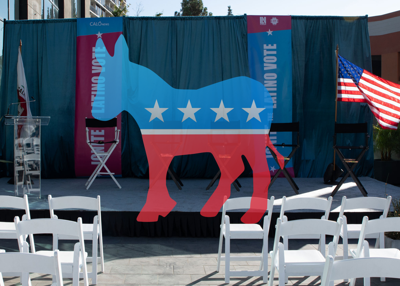
(Photo: Andres Palencia. Design: Denise Florez)
As we prepare for a second Trump term, experts, pundits, and social media users have quickly zoned in on one aspect of the 2024 election results, the Latino vote.
On social media, there have been many posts demonizing Latinos and some even taunting the future plight of immigrants who might get deported by saying that Latinos will deserve what they get, having voted for Trump.
Latinos, who have historically supported the Democratic party, were divided in this election.
According to AP results, 50% of Latino men voted for Kamala Harris while 47% voted for Trump. For Latina women, 60% voted for Harris while 38% voted for Trump. Overall, Harris got 56% of the Latino vote. Trump received 42% of the votes.
Initial numbers circulated on social media indicated that Latino men voted 54% for Trump, but as we checked AP official numbers, the number is a slight majority for Harris.
Even so, it is hard to deny the gains that Trump made within the Latino community.
Before the election, there were indications that a second Trump term was a concern for Latino advocacy groups. Factoring out the fact that Republicans have always had between 20 to 40 percent Latino support, with many Cuban and 2nd and 3rd generation Latinos included. This election seemed different. With direct attacks against Mexicans and in the final weeks even Puerto Ricans, it seemed that Latinos would shun Trump. The fact that this did not happen and in reality, his support grew was a shock to many, but not all.
According to earlier polls, Harris lagged in Latino support even in California. In the end, Harris received 57.3% of the votes in the Golden State, while Trump received 40.1%
In 2016, he received 31.5% of the vote, while in 2020 he increased his numbers in California to 34.3%.
Political experts wondered why he would bother with a Coachella rally late in the election. There was no way for him to win California. It was true, he didn’t win, but he did increase his percentage.
Latinos voting for Trump is a sign of dissatisfaction with a Democratic party that did not reach out enough or in time to make a difference.
Harris announced an agenda for Latino men almost in the last week of her campaign, but it was too little and too late.
In contrast, although Trump had little in the way of actual policies, he successfully sold the fear that undocumented immigrants were taking “Hispanic and Black jobs.” Considering the economic fear of many low-income Latinos living paycheck to paycheck or even the Latino businessmen who felt Trump would offer lower taxes, for the 54% of Latino men, the choice was Trump.
In the end, it was the pursuit of the elusive American Dream, the pursuit of a better economic future that persuaded Latinos.
There will be plenty to reckon with in the Latino community. Thanksgiving and Christmas dinner discussions about racism, homophobia, colorism, toxic masculinity and machismo will need to be addressed, as they deal with a decision that could very well send some of their family members back to the Latin American countries that they left for a better life. As we like to say in Spanish, la ropa sucia se lava en casa.
We need to have these discussions, but for now, we can recognize the fact that Latinos are far from being a monolith and that the community needs to rally against the massive deportations that Trump’s incoming administration is planning to do. We have to focus on the most vulnerable of us, the undocumented hard-working immigrants who will face deportation thanks to the incoming president.
The CALÓ News editorial board publishes separately from the newsroom.










(0) comments
Welcome to the discussion.
Log In
Keep it Clean. Please avoid obscene, vulgar, lewd, racist or sexually-oriented language.
PLEASE TURN OFF YOUR CAPS LOCK.
Don't Threaten. Threats of harming another person will not be tolerated.
Be Truthful. Don't knowingly lie about anyone or anything.
Be Nice. No racism, sexism or any sort of -ism that is degrading to another person.
Be Proactive. Use the 'Report' link on each comment to let us know of abusive posts.
Share with Us. We'd love to hear eyewitness accounts, the history behind an article.